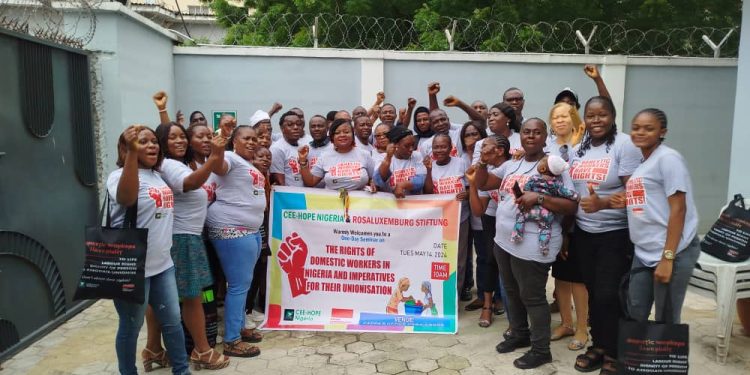Betty Abah, the Executive Director of CEE-HOPE Nigeria, has said a lot of domestic workers in Nigeria are underpaid, with many of them facing various forms of abuse and dehumanization from their employers.
Abah made this known while speaking at a one-day seminar on the rights of domestic workers organized by CEE-HOPE Nigeria with support from Rosa Luxemburg Stiftung.
Abah explained that although domestic workers provide essential services, they rarely have access to rights and protection, adding that domestic workers work mostly in isolation and harsh unregulated conditions, underpaid and with many facing various forms of abuse ranging from physical, sexual, psychological and dehumanization.
Abah, who said 64 million girls and 88 million boys are in child labour globally, noted that “millions of underaged persons are in domestic work and facing multifaceted abuse despite existing laws and conventions that criminalize child labour in Nigeria.”

She added that “domestic workers are not only oppressed, they continue to remain invisible and unrecognized. Domestic workers are not unionized and because they are not part of the organized labour union and have no union of their own, their human rights and labour rights are violated.”
Sharing some of the challenges that domestic workers encounter, Abah explained that “most of the young people in our shelter were sexually abused by their employers, and it is just a few that have been able to find their voice.
“We can’t keep crying all the time to a government that is not interested in listening to us. We believe it will make a lot of difference if the domestic workers are well informed of their rights and are unionized,” she added.
Labour activist, Hassan Soweto said the horrible experiences of domestic workers are largely underreported as they do not have what it takes to get noticed.
Soweto said “there is hardly any teenage female domestic worker who is not being regularly sexually assaulted in different homes across the country and she is unable to report it.
“Even when she reports to the woman of the house, it is not to address the issue or escalate it because the perpetrators are either the woman’s husband or her children. So, there is conspiracy of silence against the survivor as there is no one in the house who is obligated to take care of her interest,” he added.
The Labour activist thereafter noted that unionizing domestic workers provides a platform to ensure that domestic workers report the challenges they are encountering in different homes where they work and it would also help to provide an appropriate database of all domestic workers, where they are and to be able to provide adequate intervention.
He also called for collaboration among organizations that are working to unionize domestic workers like the Federation of Informal Workers (FIWON) and the need to look into existing bills at the National Assembly which will promote the rights of domestic workers.
Ronke Oyelakin, the Lagos State Coordinator of the Child Protection Network (CPN), explained that the Child Rights Act of Lagos State made it clear that every child must be given equal opportunity, regardless of their background.
Oyelakin dissuaded the use of children as domestic workers and noted that children who are engaged as domestic workers are at risk and their labour is often forced, unpaid or underpaid.
She noted that anyone who wants to engage children aged 15 and above as domestic workers needed to register with the appropriate agency of government in charge of labour and employment, adding that “such child must be enrolled in school, and given age-appropriate work, no forced labour and the child’s fundamental human rights must be protected.”
She appealed to members of the public to report any suspected cases of child abuse, child labour or exploitation to the appropriate authorities.

Comrade Funmi Jolade Ajayi, a child rights activist, who shared her experience of maltreatment and dehumanization while living with her uncle as a child, explained that it is important for families to protect the rights of children in their custody.
She thereafter called for more robust engagement and sensitization on the rights of domestic workers.
The seminar had in attendance labour activists, human rights activists, women’s and children’s rights activists, media professionals and relevant stakeholders.


